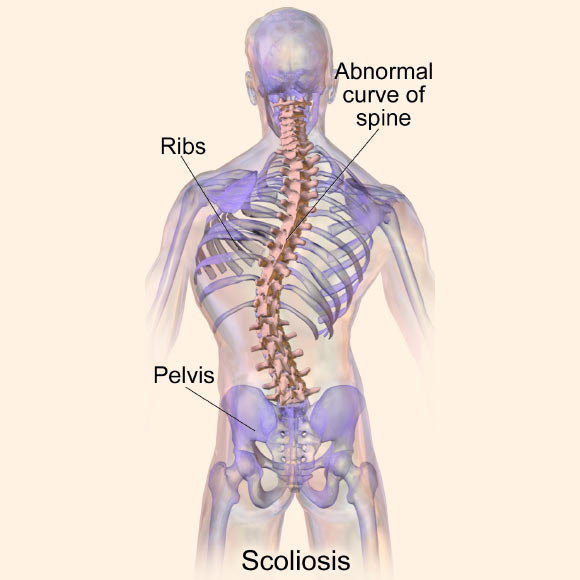A research team led by Washington University scientists has found that children with severe scoliosis are twice as likely as children without the disease to carry a gene variant that makes it hard for their cells to take in and use manganese. The findings are published in the journal Nature Communications.

Haller et al suggest that the body’s inability to fully utilize manganese might be to blame for some cases of severe scoliosis. Image credit: Blausen.com, doi: 10.15347/wjm/2014.010.
Scoliosis is the most common pediatric musculoskeletal disorder. About 3 million new cases are diagnosed every year. Most are mild and require only that doctors keep a watchful eye on the condition.
Children who develop a moderate bend to their spine may need to wear a back brace until they finish growing. In rare cases, the curvature is so pronounced that it requires surgery to correct.
Cases of scoliosis tend to cluster in families, but not in a simple way, which suggests that many different genes each play a small role in increasing the risk of the disease.
To identify such genes, Professor Christina Gurnett and co-authors scanned all the genes in 457 children with severe scoliosis and 987 children without scoliosis.
They found a variant in the gene SLC39A8 (p.Ala391Thr, rs13107325) in only 6% of the healthy children but 12% of the children with severe scoliosis.
A second analysis in a separate group of 1,095 healthy children and 841 children with moderate to severe scoliosis also found that children with scoliosis were about twice as likely to carry the variant.
When the team bred zebrafish with a disabled SLC39A8 gene, the fish developed movement and skeletal abnormalities, including curves in their spines.
This gene hasn’t been studied much, but there are some reports that it helps cells take in minerals such as zinc, iron and manganese.
The study authors found that human cells with the gene variant successfully took up zinc and iron but failed to take in manganese.
They also discovered that children with the gene variant had significantly lower levels of manganese in their blood than those with the more common form — although both groups were still within the normal range.
“Our study links a common disease to something that’s potentially modifiable in the diet,” Professor Gurnett said.
“But we don’t want people to go out right now and start manganese supplements, because we already know that too much manganese can be harmful.”
Manganese is both an essential mineral and a toxin. High doses can cause manganism, a permanent neurological condition characterized by tremors and difficulty walking, as well as psychiatric symptoms such as aggression and hallucinations.
Too little manganese, on the other hand, can cause manganese deficiency — although this is rarely seen in people because the human body needs only trace amounts that are easily obtained from food. But animal studies show that lack of manganese can result in problems metabolizing fat and sugar, impaired growth, difficulty walking and curvature of the spine.
The children with the genetic variant did not have manganese deficiency, but they may be unable to use manganese as efficiently as others.
“The genetic variant does not stop the gene from working entirely, it’s just not working optimally,” said study first author Dr. Gabriel Haller, a researcher in the Department of Orthopaedic Surgery at Washington University, St. Louis.
“So maybe most people need a certain level of manganese in their blood, but if you have a bad gene variant like this one, you need more.”
Any manganese supplementation would have to be carefully measured to avoid raising the risk for other serious diseases, the researchers cautioned.
“We’ve started doing these studies in zebrafish by adding manganese to their water,” Professor Gurnett said.
“But we still need to do human studies to figure out how much exactly is both safe and effective.”
_____
Gabe Haller et al. 2018. A missense variant in SLC39A8 is associated with severe idiopathic scoliosis. Nature Communications 9, article number: 4171; doi: 10.1038/s41467-018-06705-0







